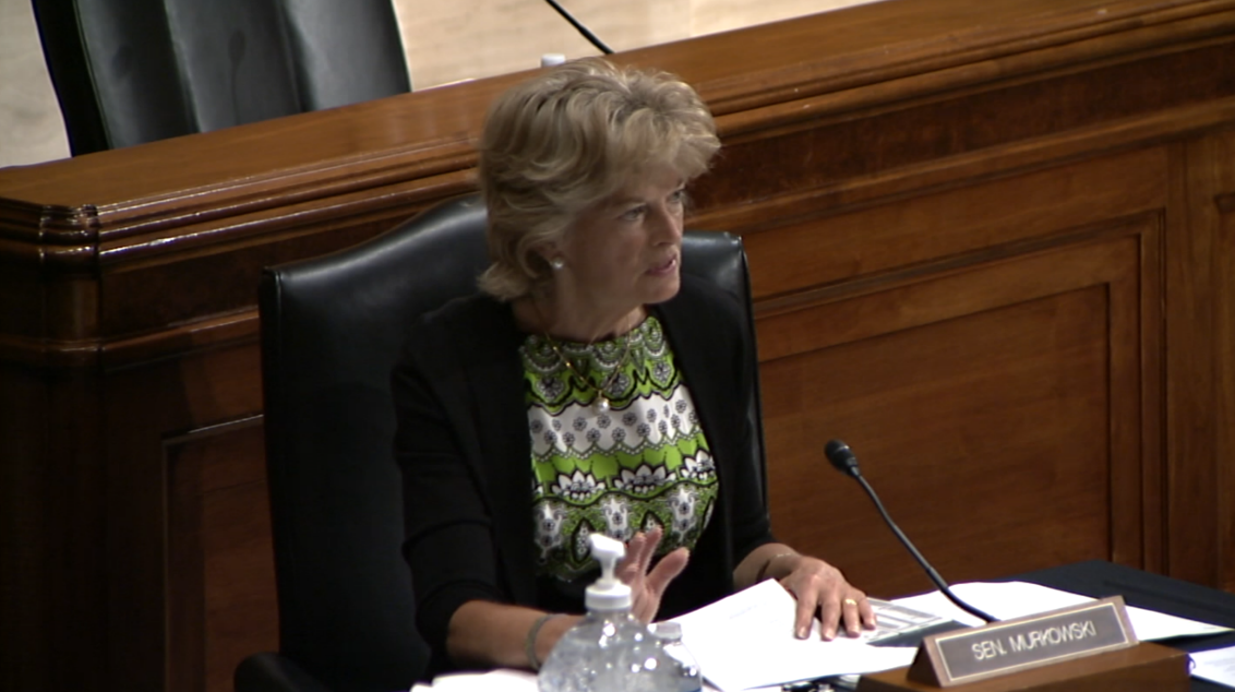Murkowski Joins Hearing on COVID-19: Lessons Learned
Addresses the need for America to Create a Comprehensive Plan to Save Lives
As we continue to navigate the impacts of the COVID-19 pandemic and work to create a safer future for all Americans, U.S. Senator Lisa Murkowski (R-AK) participated in a Senate HELP Committee hearing focused on lessons learned from the COVID-19 response thus far and the actions Congress should take to improve U.S. pandemic preparedness and response capabilities. The hearing included testimony from witnesses who spoke to their experiences as state and federal officials during past pandemics as well as their current work during COVID-19.
Expert witnesses included: William Frist, MD, former U.S. Senate Majority Leader; Joneigh S. Khaldun, MD, MPH, FACEP, Chief Medical Executive and Chief Deputy Director for Health at the Michigan Department of Health and Human Services; Julie L. Gerberding, MD, MPH, Executive Vice President and Chief Patient Officer, Merck & Co., Inc. (and former CDC Director); and Governor Michael O. Leavitt, former U.S. Secretary of Health And Human Services (and former Utah Governor).

Click here for video of Senator Murkowski.
Senator Murkowski spoke on the importance of developing an understanding on both prior and future pandemic response efforts. In Alaska, that includes working to ensure the state continues to have adequate health care supplies and testing capacity. Murkowski also noted the challenges of using outdated public health IT infrastructure for contact tracing efforts.
Murkowski also questioned witnesses on how to best approach the process of contact tracing, whether it be at the state and national level, and what we need to do to better support contact tracing.
“The question that I would have is whether or not we need to have a national contact tracing program, or do you believe that we can focus our attention on bolstering the funding and the capacity of the public health at the state and local level, because when I talk to Alaskans they are saying, ‘I think we have this. We want the support, the financial support, but we don’t know if we want a national program.’ So I would ask you Dr. Frist and you Governor Leavitt, for your views on that role with contract tracing? Because going forward, I think this is going to be a key aspect to how we can stay on top of what we are dealing with,” asked Senator Lisa Murkowski.
Dr. Frist shared that it is important to learn quickly about contact tracing and apply that information as it is the most effective action to mitigate the spread of COVID-19. He further stated support for a federally funded federal workforce, “and then allocation of that funding to the states so they can get it up and running today.”
Governor Leavitt also confirmed that developing a national strategy will be essential to combatting future pandemics.
“Senator, I believe that a national strategy is required, and it will require some local, some local execution. Let me be deliberate about that. Clearly we will need to have national funding to support this in an emphatic way that Senator Frist has articulated. Second, there has to be a national system that local input feeds into where standards are used in how data is collected so it can be rolled up quickly…” said Governor Leavitt. “So we can have a national system, but it will require some execution by the local level that ought to be done according to a set of national standards.”
BACKGROUND:
- On June 17, the Senate HELP Committee held a hearing focused on telehealth services and the lessons learned from the pandemic regarding this form of health care delivery.
- On June 10, the Senate HELP Committee held a hearing on going back to school safely for K-12, with a focus on ensuring all students receive the academic, technological, health, and social-emotional support they need to succeed. The hearing also focused on addressing the needs of homeless students.
- On June 4, the Senate HELP held a hearing on going back to college safely during COVID which focused on how institutions of higher education are preparing for students, faculty, and staff to return to campus this fall.
- On May 12, the Senate HELP Committee held a hearing titled “COVID-19: Safely Getting Back to Work and Back to School.” The hearing focused on how U.S. Department of Health and Human Services agencies are working to help states and communities prepare to reopen in light of the COVID-19 pandemic, including efforts to increase testing, accelerate research, develop treatments and vaccines, and provide public health and safety guidance.
- On May 7, the Senate HELP Committee held a hearing titled “Shark Tank: New Tests for COVID-19.” The hearing focused on the current status of testing for the COVID-19 virus and how the National Institutes of Health (NIH) and the Biomedical Advanced Research and Development Authority (BARDA) are working to support the rapid development of new tests for COVID-19, through the NIH Rapid Acceleration of Diagnostics (RADx) Initiative and other programs.
COVID-19 SAFETY NOTICE:
In accordance with the U.S. Senate’s Attending Physician and the U.S. Senate Sergeant at Arms, in consultation with the Department of Health and Human Services and the Center for Disease Control and Prevention, Senate hearings have enacted the following adjustments to help ensure the health and safety of all participants during the COVID-19 pandemic: Members were seated six feet apart to respect social distancing guidelines; Participants were given the option to take part in the hearing by video conference; To maintain social distancing, very limited seating was accommodated; Members wore masks to and from the hearing room, but were allowed to remove masks during the hearing, if they chose to do so, as they were seated 6 feet from other members.








